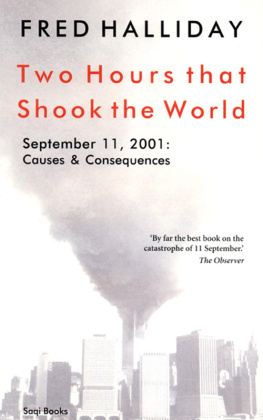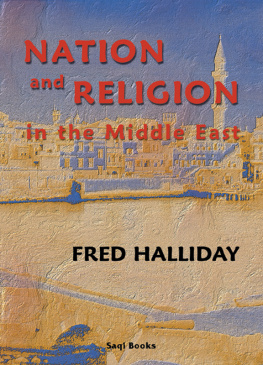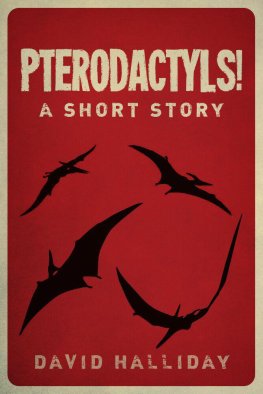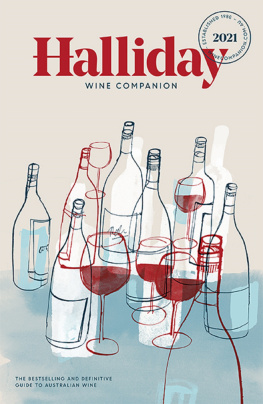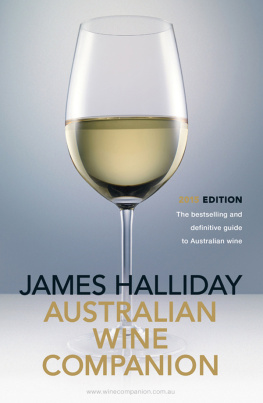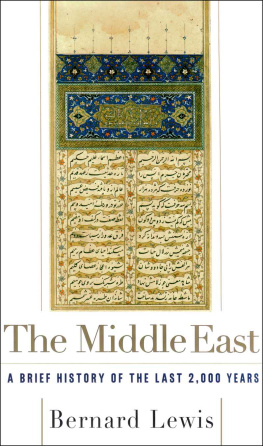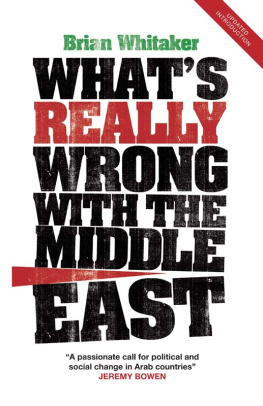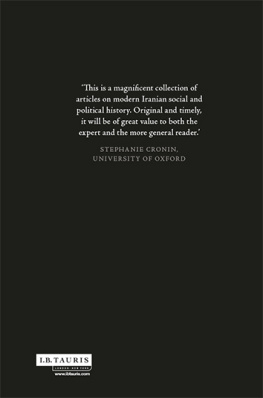Fred Halliday
ONE HUNDRED MYTHS
ABOUT THE MIDDLE EAST
SAQI
When I wished him a good trip and good luck in his new life, he replied with such typically Moslem phrases that I observed, But you are Jewish. How is it that you speak of God in this manner? His visage transfigured, he launched into a discourse of striking eloquence, and a crowd gathered around us. Only an askari looked disapproving and protested to me: Why do you listen to this Jew? I replied that everybody had the right to speak, and the majority of the crowd agreed with me. With astonishing oratorical ability for a simple peasant, the blacksmith proclaimed the glory of God, Who is the same for all men, and Who is present throughout the world.
Claudie Fayein, A French Doctor in the Yemen, 1951
Go into the London Stock Exchange there you will see the representatives of all nations assembled for the benefit of mankind. There the Jew, the Mohammedan and the Christian treat each other as if they were of the same religion, and they give the name of infidel only to those who are bankrupt.
Voltaire, Lettres Philosophiques, 1728
As best I could I had answered their many questions. They were surprised when I told them that Europeans were, with minor differences, exactly like them, marrying and bringing up their children in accordance with principles and traditions, that they had good morals and were in general good people.
Are there any farmers among them? Mahjoub asked me.
Yes, there are some farmers among them. Theyve got everything workers and doctors and farmers and teachers, just like us.
I preferred not to say the rest that had come to my mind: that just like us they are born and die, and in the journey from the cradle to the grave they dream dreams some of which come true and some of which are frustrated; that they fear the unknown, search for love and seek contentment in wife and child; that some are strong and some are weak; that some have been given more than they deserve by life, while others have been deprived by it, but that the differences are narrowing and most of the weak are no longer weak. I did not say this to Mahjoub, though I wish I had done so, for he was intelligent; in my conceit I was afraid he would not understand.
Tayib Salih, Season of Migration to the North
Preface
We hear a lot about the roots of the Iberian Peninsula and of places beyond. We hear about the roots of our societies and historical communities But man is not a tree. He does not have roots, he has feet, he walks.
Juan Goytisolo, Metaforas de la migracin,
El Pas, 24 September 2004
In 1984 the British historians Eric Hobsbawm and Terence Ranger edited a book with the challenging title The Invention of Tradition (Cambridge University Press, 1992). In it, with a wealth of examples drawn from different countries, they showed how what is presented as a legacy of the past as tradition or heritage, as something given by history is often a reflection of the contemporary imagination, an act of selection when not of invention. In the British Isles the modern family Christmas and the Scottish kilt are examples of this, as is, in the years since the book was published, the celebration of St Georges Day, 23 April, as an English national holiday and the prominence, not seen before in modern times, of the flag of St George itself.
The general significance of this book and of its central argument, is, however, enormous, since it goes to the heart of one of the most pervasive claims of modern times, of modern political culture and political ideology that there is a given past, a set of established traditions, to which we in whatever country, culture and tradition can relate in both an analytic and a moral sense, i.e. which we can use to explain how the world is as it is, and also to provide a set of moral and sometimes religious principles, on the basis of which we can and should live. Such claims have, in many ways, become stronger in recent decades, in both the developed world Europe, Japan and North America and in the Third World, not least the Middle East. The most obvious form of this is the strengthening of claims based on interpretation of religious texts, what is generically and not wholly inaccurately termed fundamentalism, a trend evident in Islam, Judaism, Christianity and Hinduism. But the stronger claims of nationalism in general, across most of the world, also involve the invocation of the past, as something given and good. Whereas a generation or two ago, much was made of the campaign against the past, of the need to cast off the shackles of tradition, backwardness, superstition, obscurity in all its forms, in favour of a new aptly termed Enlightenment, we seem now to have reversed the argument. In politics, religion, customs, and, not least, food, the cult of the past, of the supposedly given and traditional, holds sway.
100 Myths about the Middle East is an attempt to engage with this trend, and rests on three broad arguments. The first is, in the spirit of Hobsbawm and Ranger, to question the historical accuracy of what is presented as the traditional and the authentic. The Middle East appears to be a region where the past, political, national and religious, holds sway but on closer examination this is far from being the case. Whatever their claims to antiquity, all the states of the Middle East are modern creations, a result of the collapse of the Ottoman and Czarist Russian empires at the end of World War I, and of the interaction of these states with a modern global system of political, military and economic power.
When it comes to particular forms of claim and symbol, a similar modernity applies. Neither the claims of Islamist nor of Zionist politicians to be recreating a lost past are valid. The concept of the Islamic state, propounded in Shiism by Ayatollah Khomeini through the Iranian Revolution of 19789, and that of a revived Caliphate, endorsed by conservative Sunnis including al-Qaida, are modern political projects. The state of Israel, for example, bears no relation except rhetorically to the ancient kingdoms of Solomon and David. Many of the most potent symbols of contemporary politics are also recent creations. Thus the Saudi monarchys claim to be khadim al-haramain (Servant of the Two Holy Places) was introduced only in 1986, and then in order to head off rival claims by King Hussein of Jordan to be the patron of the al-Aqsa mosque in Jerusalem; while Osama Bin Ladens comparable term for Arabia, bilad al-haramain, (Land of the Two Holy Places) is an invention of his. All the monarchies of the Middle East claim ancient, ritualised, legitimacy, but they are, in fact, creations of the twentieth century, of the vogue for kingship that, late in the day, swept the Arab world, and, not least, of attentive, and at times military, support given to them at times of crisis by their more powerful friends in Europe and the US.
Much is made of the ancient, atavistic, millennial character of the Arab-Israeli conflict. This is pretext, and a misleading one at that the causes of the contemporary Arab-Israeli conflict lie in the formation of two rival social and ethnic communities in Mandate Palestine in the period from 1920. They have nothing except in the selective use of symbolism to do with the texts of supposedly sacred books or events of 1,000, 2,000 or 3,000 years ago.


